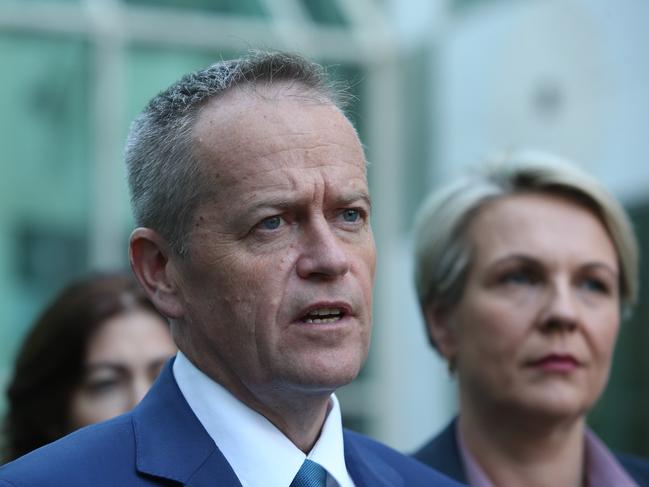Labor releases scathing 2019 election review
Jay Weatherill’s review into Labor’s shock 2019 federal election loss has blamed an “unpopular leader” and an inability to change strategy when the Liberals switched leaders.
SA News
Don't miss out on the headlines from SA News. Followed categories will be added to My News.
- Kevin Rudd’s assessment of what went wrong for Labor
- Get the most out of your Advertiser digital subscription
Labor has blamed its shock election loss on having an “unpopular leader” in Bill Shorten, a “cluttered” policy agenda and a “weak strategy” that failed to adapt to Scott Morrison being Liberal leader instead of Malcolm Turnbull.
Clive Palmer’s unprecedented $60 million advertising campaign also damaged Labor, while One Nation’s decision to preference the Coalition “probably” cost Labor two seats.
Former SA premier Jay Weatherill and former minister Craig Emerson made 60 findings and 26 recommendations in a damning review made public today.
One of the findings in chapter one, titled ‘Why did Labor lose’, was “Bill Shorten’s unpopularity contributed to the election loss”.
A key recommendation was for Labor to drop its “divisive” rhetoric, including references to “the big end of town”.
The review has not examined the merits of Labor’s key policies.
Instead, the federal party will decide whether to keep or scrap certain policies.
But it found the franking credits policy — which was seized upon by the Liberals — did not cost Labor the election.
It also found that Labor should continue to back strong action on climate change.
“We believe that this is a bedrock principle for the Labor Party and cannot be abandoned,” Mr Weatherill said today.
“Precisely what the policy should be is, of course, a matter for the Federal Labor Party,” he said.

Senior party figures have told The Advertiser Labor won’t be new announcing new policies any time soon.
The review found the ALP did not “settle on a persuasive strategy for winning the election” and did not “craft a simple narrative” to unify its policies.
It also slammed Labor’s campaign, which “lacked a culture and structure” that encouraged MPs to speak out against positions they felt weren’t working.
This led to warnings from within the party about the campaign’s direction being dismissed, the review found.
The review also noted Labor failed to campaign “sufficiently and consistently” on reasons to vote against the Coalition, targeted too many seats – which meant resources were spread too thin – that the campaign’s impact was diluted and it failed to adapt to the Liberal Party having dumped Mr Turnbull as leader.
The more-than-two dozen recommendations include:
ABANDONING Labor’s “divisive” rhetoric including references to “the big end of town”;
FEWER campaign policies, which are easily explainable to reduce “misrepresentation”;
MORE women in its campaign team;
ENGAGING more with Chinese Australians, and broadening its support base and standing with low-income families, Christian community groups, and regional and rural Australians.
More than 120 people including MPs, former MPs and candidates, were interviewed during the review, which received more than 800 submissions.

Speaking in Melbourne today, Mr Weatherill said Labor’s policy agenda “paradoxically frightened the very people we were trying to support”.
“It was regarded as too complex, it was regarded as not persuasive,” he said.
Fake news about a ‘death tax’ which it was wrongly claimed Labor would launch was one of the factors in its loss, along with Mr Palmer’s massive advertising spend.
It was a “serious threat to democracy” that one individual could have “such a profound effect on the share of voice of a major party,” Mr Weatherill said.
“We do recommend that there are spending caps in relation to high-net worth individuals who make contributions into election campaigns,” he said.
Prime Minister Scott Morrison slammed Labor for “still talking about themselves” six months after the election.
“We are focused on what the Australians elected us to do ... whether it’s acting on drought, whether it’s dealing with the big challenges we’ve got in aged care [or] delivering the tax relief we said we’d do.”
A key finding of the review was that Labor’s negative gearing and franking credits tax policies “did not cost the Party the election”.
But the “size and complexity” of Labor’s spending announcements “exposed” the party to Coalition attacks that “fuelled anxieties” among lower-income working families in the suburbs and regional Australia that Labor “would crash the economy and risk their jobs”.
The review echoed Labor MPs who have been outspoken about the need to focus on working Australians, and not inner-city progressive issues.
It found working Australians would “lose faith in Labor if they do not believe the Party is responding to their needs, instead of being preoccupied with issues not concerning them or that are actively against their interests”.
Labor could not become a “grievance-based” party that tackled every issue.
“Low-income workers swung against Labor,” the review said, noting its ambiguous language on Adani and “anti-coal rhetoric” in Queensland was particularly damaging.
“On the whole, people of faith did not desert Labor, but Labor lost some support among Christian voters – particularly devout, first-generation migrant Christians,” it said.
“Other religious denominations did not swing decisively one way or the other.
“Higher-income urban Australians concerned about climate change swung to Labor, despite the effect Labor’s tax policies on negative gearing and franking credits might have had on them.”
But the review found Labor should not abandon its core values of ‘improving the job opportunities, security and conditions of working Australians, fairness, non-discrimination on the basis of race, religion and gender, and care for the environment’.
Ahead of the review being made public, Mr Shorten said he would have offered Australians even bigger tax cuts and taken a “different position” on the so-called retiree tax if he could do the 2019 election again.
The former Labor leader has also revealed he isn’t going anywhere, saying he will stay in politics for “the next 20 years”.
Mr Shorten made the comments just before Mr Weatherill handed down his review of Labor’s election defeat.
“Were the universe to grant re-runs, I would campaign with fewer messages, more greatly emphasise the jobs opportunities in renewable energies and take a different position on franking credits,” Mr Shorten said.
“In 2018, I presided over a bigger tax cut plan than the Liberals for ten million working Australians but I concede, with hindsight, when they matched ours, we should have gone bigger again.”
My response to the election review pic.twitter.com/vStsCevdpj
— Bill Shorten (@billshortenmp) November 7, 2019
Mr Shorten has also claimed Mr Weatherill’s election post-mortem has “not considered or reviewed the merit” of Labor’s election policies.
“We must learn the lessons of defeat,” Mr Shorten said.
“And while the review has not considered or reviewed the merit of those policies it is important that the party does.”
He added: “Our great party must focus on addressing the structural and base issues that parties of labour around the world are facing so we can win the next election.
“I’m personally committed to continue contributing in public life, serving my constituents, the people of Australia – including people with disabilities and the vulnerable – for the next 20 years.”
MORE NEWS
Simple reasons behind Labor’s loss: Rudd
Wong, Butler told to ‘get back to grassroots’
SA Labor MPs got to Canberra via unions or political offices
May 18 was a disaster for Labor.
Every major poll in the country had tipped a Shorten victory for months but on the day they lost five seats.
The Coalition picked up Bass and Braddon in Tasmania from Labor, Lindsay in NSW and Longman and Herbert in Queensland.
The ALP picked up only one seat; Gilmore, on the NSW south coast.
Corangamite and Dunkley in Victoria also turned red but the seats were notionally Labor already after a recent redistribution.
In South Australia, Nicolle Flint's seat of Boothby was the main electorate in play but the Liberal MP held on by more than 3000 votes.
